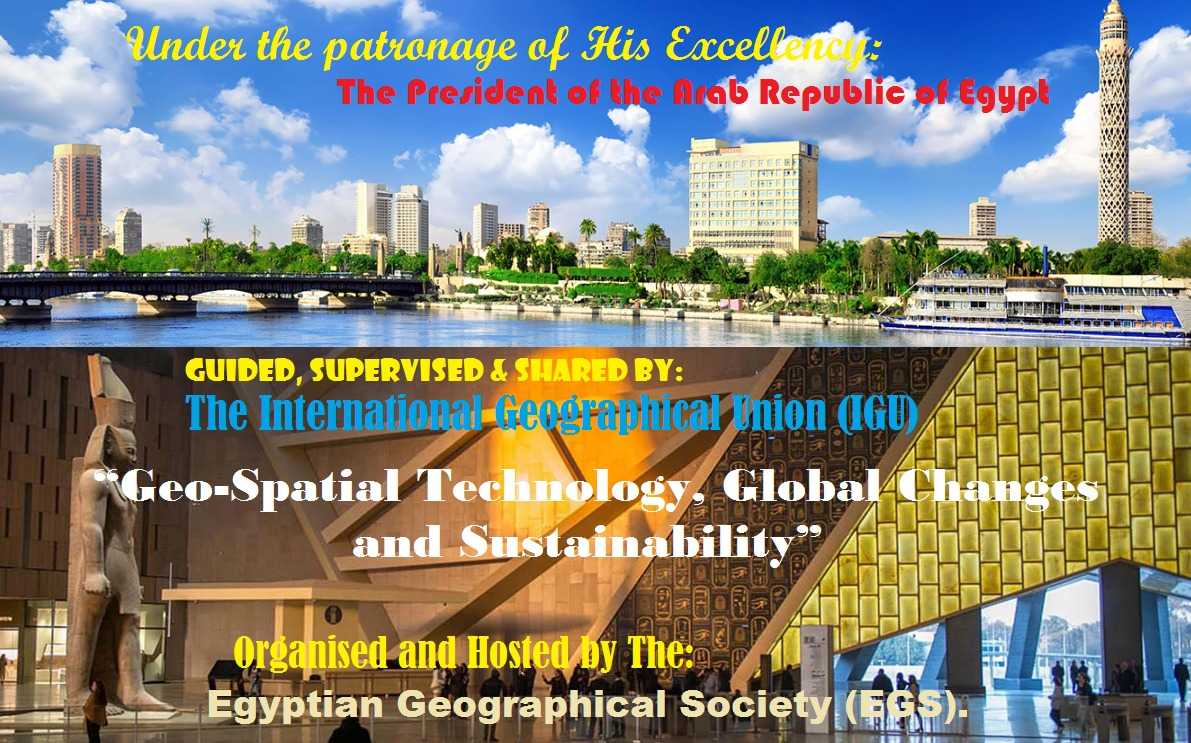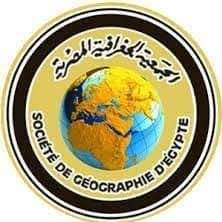
These contents are subject to slight change later.
– Symposium:12-15 April, 2025.
– Optional trips: 16-19+ April, 2025, or after that.
Participated IGU Commissions:
1. Vision of the conference:
In light of the nature and magnitude of the global and on national level changes, geographer scientists must find in themselves to contribute to theory and practice that will facilitate and sustain the development of a wider range of possible responses to the increasingly demanding pressures facing our world. The costs of exceeding the Earth’s planetary boundaries are potentially catastrophic, as serious disruptions to ecosystems, societies and economies are the likely outcome.
The proposed main theme for IGU Thematic Conference, Cairo, IGU Egypt 2025, is “Geo-Spatial Technology, Global Changes and Sustainability”, inspires a valuable idea that: natural, human disciplines, spatial and visualization information technologies, planning and professional domains could handle changes issue and set up useful views and innovations to enable the global community of keeping sustainability on global and on countries level.
2. Why in Egypt:
What Egypt is currently witnessing is largely consistent with the theme of the conference, which is also of concern to all countries specially developing ones. Egypt is witnessing several changes on various natural and human levels and is seeking development and sustainability in the light of its ambitious, national long-term political, economic, social and environmental agenda “Vision of Egypt 2030” and it’s National Climate Change Strategy for Egypt until 2050.
The long lasting history of the Egyptian Geographical Society EGS since established in 1875, since sharing in the foundation of the International Geographical Union IGU 1923, and since arranging 1925 IGU congress in Cairo, and in the light of our recent communication with IGU EC and commissions’ chairs, and the success of our series of events in the geographical arena in Egypt and Arab Area that are organized, shared with or hosted by EGS during the last few decades that witnessed openings of tens of Geography and Geomatics Departments in the Egyptian universities that graduate 11 thousands Geographer most of them with Geo-informatics skills yearly; all that had encouraged our will to arrange for the IGU Thematic Conference- Egypt 2025 on the occasion of commemorating the 100th anniversary of IGU 1925 Congress.
Please see Background
3. Aims and objectives of the conference:
· This thematic conference will seek scientific and practical answers to problems and to the wide range of global challenges using a holistic approach, within the cause-effect process, and will contain results that will reveal the world’s need for all disciplines.
· The necessity of a perception of transition from sustainable development to sustainable environment will be discussed in terms of natural and human issues.
· The conference will focus on exploring the complex relationships between society, environment and economy at local, national, regional and global scales.
Background
Egypt was the gateway to Africa and Asia during reign of Khedive Ismail of Egypt and ruler of Sudan from 1863 to 1879. Sharing the ambitious outlook of his grandfather, Muhammad Ali Pasha, he greatly modernized Egypt and Sudan, investing heavily in industrial and economic development, urbanization, and the expansion of the country’s influential role. Ismail Pasha, the Magnificent, Khedive formally opened the Suez Canal on November 17, 1869 for worldwide navigation. Egypt keeps its effective and active role in the context of the international and regional issues.
The role of the Egyptian Geographical Society, he founded on 1875, was not limited to geographical studies but extended to geographical exploration in African deserts, jungles and river Nile basin, cartographic production, ethnographic, social, economic and cultural studies.
The Egyptian Geographical Society EGS was the representation of Egypt’s centrality in the geographical ambitions’ of European and Egyptian policy makers in the 19th and 20th century.
In addition; the EGS had been honored to share in founding the International Geographical Union IGU on 1923 and in arrangement of IGU Cairo Congress 1925 under the patronage of His Majesty King Fouad.
Since its founding, the Egyptian Geographical Society EGS has been led and ran by theleaders and elite of the Egyptian community, European scientists, the finest Egyptian statesmen and politicians, European and Egyptian scholars and geographical explorers. The EGS represents geographical heritage that was written by European andEgyptian authors for this important region of the world.
The EGS also maintains thousands of books, script documents, geographical atlases, archaeological and architectures catalogs, hard copy, daioramic, copper or glass negative plate’s maps. EGS keeps antiques and luxury artifacts, used in the internal explorations in Africa, as well as collections from local communities that extent from weapons to tools to musical instruments. EGS also possess samples of necessities and domestic tools of inhabitants of old Cairo and subsistence tools for daily life and rare antique collectibles of social events for the Egyptian society and the local communities of neighboring countries
This represents national, international memory for ethnography, inherited culture,political history, and history of civilization, historical natural conditions,social life of neighboring countries and some other countries.
The EGS now represents Egyptian geography professors, faculty post graduate students.
It also represents graduates of the departments of geography, branches of cartography, surveying, and Geomatics who counts 11 thousands per year many of them with Geo-informatics skills who work in teaching and work on surveying and mapping in development projects. EGS membership includes members from Egypt, Arabic and African countries. It has solid relations with peer geographical associations especially in our region.
109 Qasr Al-Aini Street, Garden City, Tahrir Square, cairo, Egypt
EGS President of board of directors
EGS Secretary General
Conference Secretary
Prof. Dr. Ismail Youssef Ismail
00201280610899
